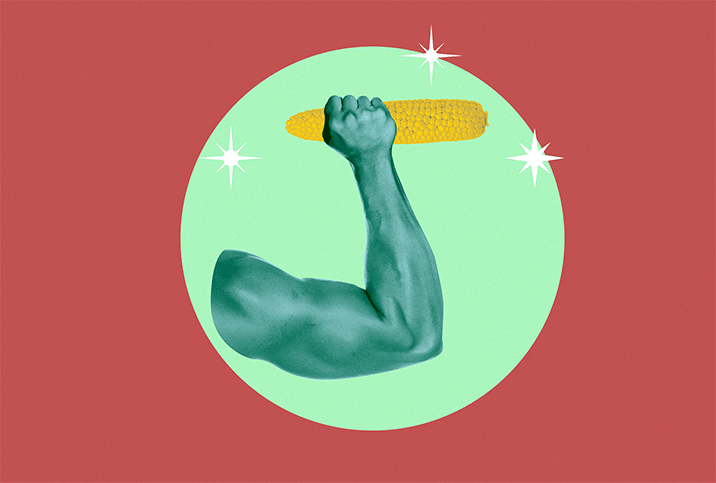Guys, Your Well-Being Is in Your Hands: Male Masturbation Is Healthy

In the first season of the semi-autobiographical TV show "Dave" on the FXX network, the protagonist, played by satirical rapper Dave Burd, sneaks into the bathroom with a half-bodied rubber sex doll after he fails to orgasm while having sex with his partner.
Dave places the doll over the sink and proceeds to enter it from behind. His girlfriend interrupts, knocking at the door and announces she has to pee. Dave encourages her to go in the sink, presumably in the kitchen. She declines.
He opens the glass door to the shower and shoves the doll inside to hide it. His partner comes in and sits down on the toilet to urinate. As they exchange words, the feet and legs of the doll flop outside of the shower into view, with comedic effect.
While Dave opted for an inanimate object in lieu of unfulfilling partner sex, using a doll as he did, or some other toy or device to approximate the sensation of intercourse and experience orgasmic self-pleasure, can—in some cases—make orgasms easier to achieve than having insertive sex with another person.
Rather than seeing it as shameful, a man can embrace self-pleasure as part of a wellness routine.
"One thing that I do see in a lot of my clients is that, over time, they've sort of established what they all refer to as the death grip," said Natalie Goldberg, L.M.F.T., a certified sex therapist with Creating Change LA in Beverly Hills, California. "Over time, if your grip during masturbation gets tighter and tighter, and it gets to the point where it's sort of hard to mimic [during] partnered sex, then it can become more challenging for them to orgasm from partner sex."
She often encourages people to use a fleshlight to masturbate. That sensation, she said, is not quite as intense or tight but does mimic more of the experience during intercourse.
Beating the meat. Choking the chicken. Shaking hands with the milkman. People use any number of euphemisms to describe male masturbation. Whether or not dolls or other devices are used to enhance it, "the self-stimulation of your genitals or other sensitive areas of your body for sexual arousal or pleasure" is common among people of all sexes, genders and ages and is "a normal, natural way to explore your body, feel pleasure and reach the point of sexual release (orgasm)," according to Cleveland Clinic.
Getting over the stigma
Myths and misconceptions and enduring stigma, unfortunately, shape how some view the activity.
"Many people were raised [to believe] that masturbation [is] bad," said Lauren Brim, Ph.D., a wellness and sexuality coach in Los Angeles. "And that stems from religion and even from the Victorian era. Our grandparents grew up in an environment where masturbation was a sin, masturbation was unhealthy. The doctors told people that masturbation could make them ill. It could even kill them."
We’re not that many generations removed from those widespread views, she said.
"Some people might still carry that in a conscious way," she said, "but I think many of us still have that message in an unconscious way inside of us. That's why it's so important to continue talking about masturbation and to practice self-pleasuring to reclaim what was taken from us during that period."
Attitudes about masturbation still cause unnecessary anguish for some guys, acknowledged Jennifer Litner, Ph.D., L.M.F.T., an AASECT-certified sex therapist and the founder of Embrace Sexual Wellness in Chicago.
"They may feel really inhibited by it," she said about those who acquired sexual shame. "They feel as though they need to hide, and in that kind of scenario, it can create some features of depression and other anxiety [and] mental health concerns."
Healthy versus unhealthy approaches
Rather than seeing it as shameful, a man can embrace self-pleasure as part of a wellness routine.
Consider masturbation as a form of self-care, explained Elizabeth Perri, Psy.D., P.L.L.C., a clinical psychologist and sex and relationship therapist in Chicago.
"It feels great, releases stress and helps you to explore your fantasies and experiment with different types of stimulation," she said, further noting that, as with orgasms during intercourse, masturbating can help improve sleep and even boost someone’s immune response.
Self-pleasure typically only becomes a problem if it negatively impacts other areas of life or adversely affects someone’s [existing or prospective] sexual relationship with a partner, she explained.
Goldberg doesn’t like to put a number on what’s healthy when it comes to how often someone should or shouldn’t masturbate. That can vary from one individual to the next. She prefers to assess if it’s interfering with relationships, social connections or obligations.
There could also be a concern if masturbation results in injuries, such as carpal tunnel syndrome or discomfort due to chafing. If someone identifies negative consequences in their life because of the frequency or vigor with which the person practices self-pleasure, then it could be worth scaling back, perhaps with help from a sex coach or therapist.
Men masturbate for different reasons, according to Robert Mendelsohn, M.F.T., C.S.A.T., a certified sex addiction therapist and the assistant clinical director at the Center for Healthy Sex (CHS) in Los Angeles.
One person may masturbate to facilitate sleep, he noted, whereas another might do it to distract from painful emotions or to deal with traumatic situations. But, he added, the power of self-pleasure transcends its use as a crutch to avoid working through difficult feelings.
"Masturbation can be a kind of celebration of self that, in its healthy form—whether it's involving fantasy, whether it's involving pornography or not—it's a connection to one's body," he said. "Masturbation can be a moment of awareness of one's body, and not just the penis, but the entire body. Having a sensual experience with oneself can be a really healthy, loving experience."
Masturbation as self-discovery
If someone comes to the CHS offices because they're experiencing early ejaculation or erectile issues, the anxiety that stems from and reproduces those problems often occurs because people are in their heads and not comfortably inhabiting their bodies, Mendelsohn explained.
He alluded to treatment with a rhetorical question: "What’s a better way to get into your own body than experiencing your body through masturbation?"
The activity, he noted, aids in the exploration of sexuality and in the discovery of erogenous zones. It helps a person learn what types of touch feel good.
Brim, who wrote the book "The New Rules of Sex," said masturbation might help men better understand what produces an erection.
"What brings them to orgasm? What are the different aspects of [the person’s] erotic narratives? Who are they in the erotic narratives that are exciting for them and bring them to arousal? If they haven't explored that with masturbation, they're missing this exploration of self, and it's going to impact also how they then show up in a relationship," she said.
Turning her attention to pornography, Brim noted that men she coaches who struggle with erectile dysfunction (ED) often use porn to masturbate, which perhaps denies them the proper "dress rehearsal" for sex.
"If we never have that dress rehearsal, and we always just go to this imaginary place, then it's harder for our body to show up and know what to do," she said.
Porn is OK to enjoy, she explained, but the majority of the time a guy might be better served by using his own fantasy to masturbate. For clients experiencing ED, she recommends they cut out porn until they’re able to show up for sex in the ways they want to.
The benefits of solo and partner masturbation
To better enjoy pleasurable sexual self-discovery, Perri suggests you take your time.
"You may know how to reach orgasm very quickly, and there’s nothing wrong with that," she said. "But slowing it down can help you explore different types of pleasure sensations."
To elicit new sensations, you can try experimenting with sex toys, and Perri also suggests changing up your stroke, grip and speed.
"Edging is another technique that can draw out and maximize pleasure," she said. "Stimulate the penis until right before ejaculation, then stop. Slowly resume stimulation and then pull back again. Repeat as many times as you’d like before bringing yourself to orgasm. This stop-start method can lead to more intense orgasms and may help with ejaculatory control during sex with your partner."
Self-discovery through masturbation can lead to the adoption of new techniques in the bedroom, Mendelsohn said.
"The better you know your own body, the more you can share with someone else with whom you're having sex later on," he added.
Misunderstandings about masturbation arise between some partners, Goldberg said. Someone might assume a partner masturbates because the sex they’re having is not good enough or because there’s a problem in the relationship. In some instances that might be true, but self-pleasure doesn't need to replace partner sex.
"I'm a big proponent of mutual masturbation and utilizing that as a means for partners to connect sexually," Goldberg said. "If one partner is masturbating, I don't believe you need to go hide in the bathroom to do it.
"Why not be able to do it in bed, and your partner can [lie] there and gently touch you? They don't have to be the ones masturbating even, per se. You can do it yourself. But can they play a supporting role in it? Something to that effect? I'm a big, big proponent of those sorts of sexual activities."


















